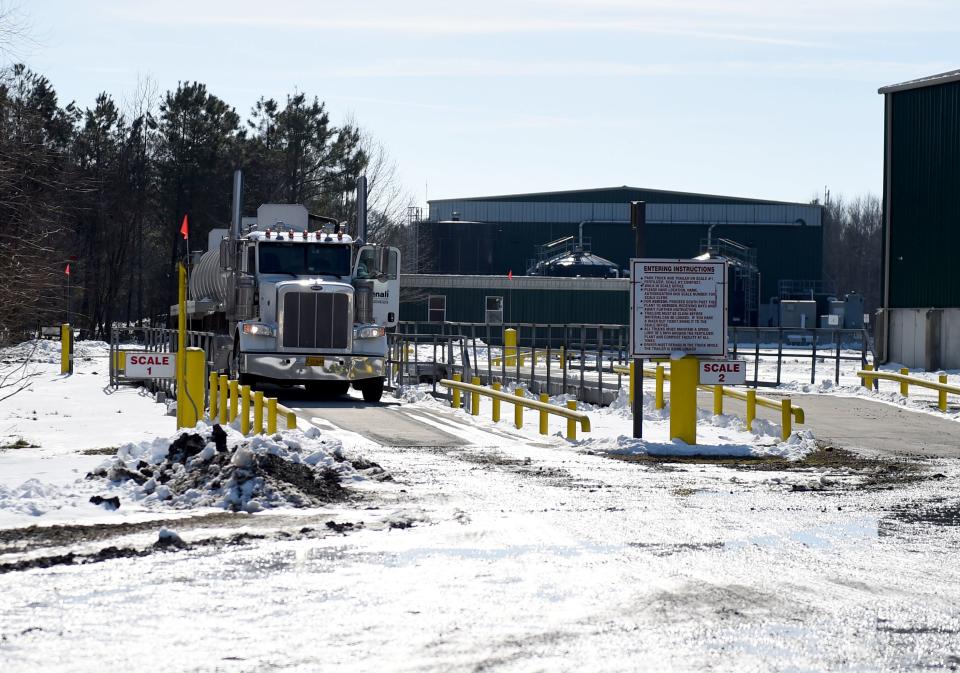This why Bioenergy Devco's gas project Is all wrong for Delaware | Opinion
It’s 2023, and Delaware is still considering new gas infrastructure. As we move ever closer to a climate tipping point, Bioenergy Devco’s proposed gas plant in Sussex County offers a test of Gov. John Carney’s climate leadership.
The proposal at hand is as simple as it is dirty. Under the company’s plan, up to 200 trucks a day would bring poultry waste — feathers, bones, carcasses, bedding, litter and more— into a new gas refinery in a small community near Seaford, to produce pipeline grade gas. Waste goes in, waste and gas come out. That gas would add significantly to Delaware’s climate burden, with projected emissions equivalent to the average gas-powered car driving 71 million miles annually. Bioenergy Devco proposes to operate in this manner for the next ten years, at a minimum — it’s a bad idea.
Bioenergy Devco’s proposal is part of a nationwide push to rebrand polluting industrial agriculture as a panacea of climate action. Even Carney embraced this dirty fuel as “renewable natural gas” in his climate plan. The truth is, it’s factory farm gas, and it’s a serious threat to our environment and health.

Over decades, massive corporations like Mountaire and Perdue have come to define Delaware’s agricultural landscape, with thousands of factory farms pockmarking our rural communities. Today, Sussex County, where Bioenergy Devco hopes to set up shop, produces more chickens than any other county in the country. But at what cost?
Thanks to the poultry industry, 97% of Delaware’s rivers and streams are impaired, and more than half our wells are contaminated with dangerous nitrates. Hundreds of people across the state have spent years mired in lawsuits over contaminated water. Proposals like Bioenergy Devco’s would only make things worse.
Bioenergy Devco’s project is reliant on the poultry industry’s continued production of waste that fouls our water and health. After all, the more waste produced, the more gas Bioenergy can sell. Perdue has already signed a contract with the company to provide waste for up to ten years. There’s every reason to believe that a factory farm gas industry in Delaware would lead to more factory farms and more waste. Whole new factory farms are being built elsewhere for the sole purpose of producing factory farm gas — this cannot be Delaware’s future.
Last month, Bioenergy Devco’s proposal came to a head in a public comment period that generated massive opposition. By the time DNREC stopped accepting written comments, letters of opposition outnumbered those in support 9:1. Among the project’s opponents were a diverse array of faith, social justice, community and environmental groups representing thousands of members, as well over 100 concerned private citizens.
There are myriad reasons to oppose Bioenergy Devco’s gas plant. In the more than two years Food & Water Watch has been organizing opposition to the facility, these are some of the concerns we’ve heard over and over again:
The plant would hurt our health. Factory farms that would feed the facility release ammonia, a smog-forming particle linked to chronic lung disease and more than 12,000 premature deaths annually. Onsite methane flaring during the refining process will release poisonous gasses from nitrogen oxides to hydrogen sulfide linked to respiratory ailments like asthma. Once the methane is extracted, the remaining waste would be applied to Delaware fields where it will leach into rivers, streams and drinking water. Drinking contaminated water can lead to serious health issues, particularly in children, including developmental delays and disabilities. Delaware ranks in the top ten states for the number of children born with disabilities and developmental delays, and research suggests that poultry waste pollution is partly to blame.
The plant is unjust, concentrating these effects in a community already overburdened with industrial pollution. The community living closest to the proposed site is home to people of color and people living in poverty at nearly twice and three times the rate of Sussex County as a whole, respectively. These folks already live frighteningly close to a Superfund site, and within a mile of dozens of poultry factory farms. Only 9% of the U.S. population is more exposed to Superfund sites than the community impacted by this proposal.
The plant would bring an unacceptable volume of traffic into an agricultural-residential neighborhood — up to 200 trips every day traveling alongside school buses and commuters. We met dozens of families concerned about how this traffic could endanger their families.
The plant would worsen climate change. As the nation’s lowest lying state, we can’t afford to add to the problem.
Carney has the power to deny Bioenergy Devco the permits it needs to operate. Stopping this gas plant would be a win for health, environmental justice, safety, climate and the environment.
Carney must say no to biogas and no to Bioenergy Devco’s proposal in Seaford.
Greg Layton is a Delaware organizer with the national environmental advocacy group Food & Water Watch.
This article originally appeared on Delaware News Journal: Bioenergy Devo Seaford Delaware Gas Plant has problems

